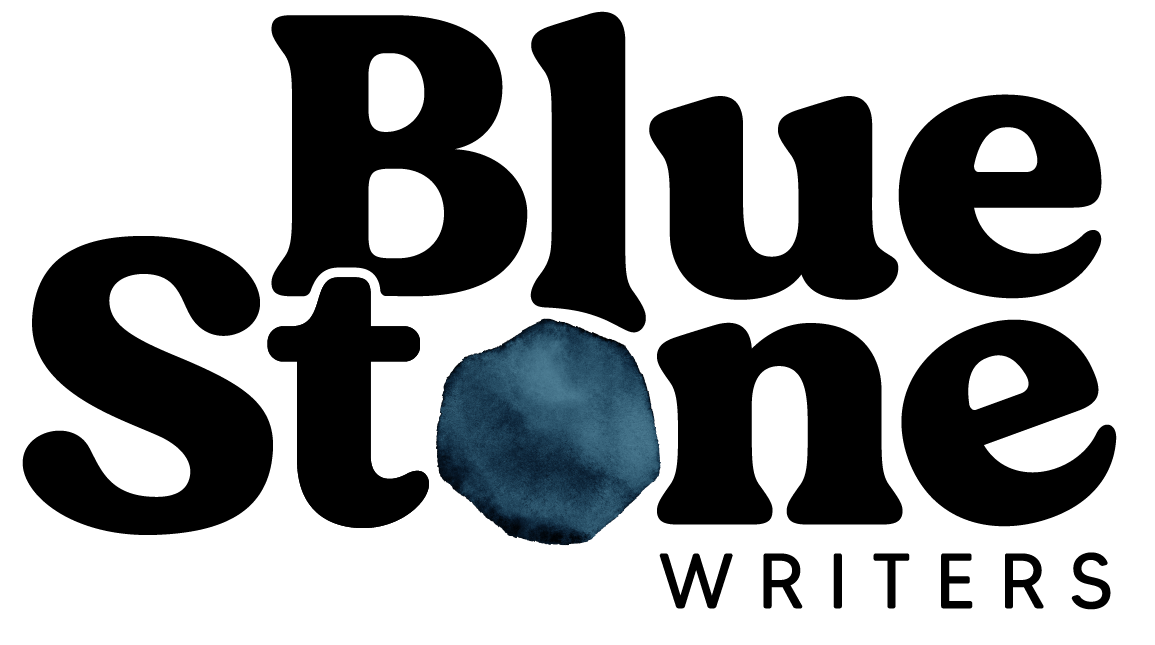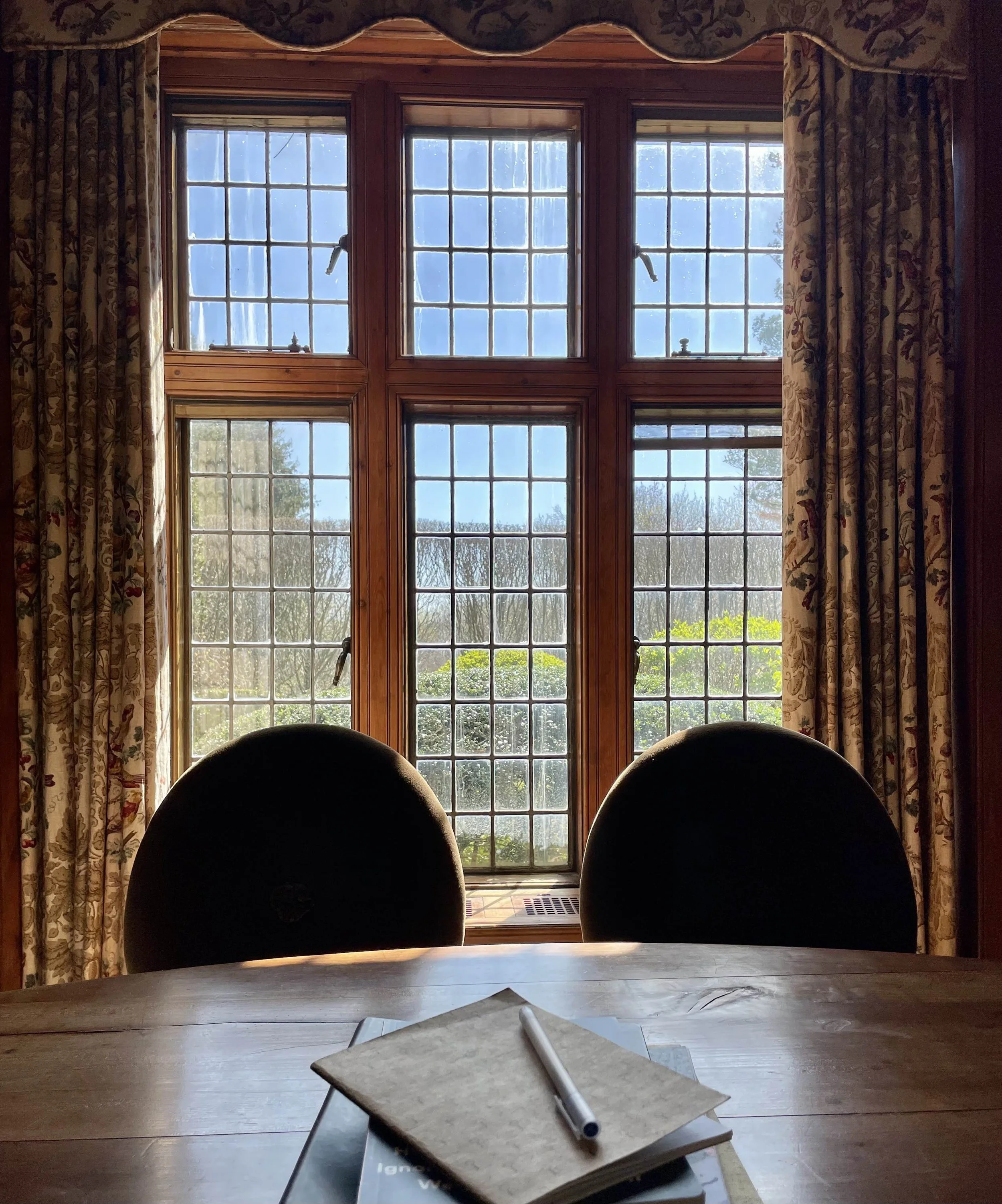The library at Foundation House.
Sometimes we writers have romantic notions of a Stephen King-like writing space (or what we imagine that to be). You know the one: a house in the Maine woods where no one can disturb you, and all you need is a coffee pot, a typewriter, and the company of a few ghosts. This doesn’t work for everyone, though, and it definitely doesn’t work for me—in part because I love takeaway coffee.
One year and one month ago, I was lucky to be an artist-in-residence at Foundation House in Greenwich, CT, the farthest thing from a cabin in the woods but with the same purpose—focus on your work, that’s all you have to do.
There was plenty of room for us residents to take up space in the rooms and on the grounds of this grand estate. My fellow resident and LEAP OUT special guest-artist Les James had one space for writing and another for her painting. Writer and comedian Gabe Bergado worked in a grand dining space with dark wood paneling and a view down to the tennis courts and the labyrinth (yep!). We all moved around, though. There was room to try out different creative corners.
I was thrilled to discover the library and table pictured here—a room filled with books and midcentury modern decor. I love working at a big table with a view; this one looked out toward the property’s orchards and a down to the pond. Early on, however, I found myself easily distracted. Sure, the grounds begged to be explored, so that was excuse enough to leave the table, but the thing is, I was just having trouble working alone.
When I arrived at Foundation House, it had been a long while since I’d had time and space to dedicate to my writing. I’d had a rough year health-wise, and I was tired. A couple days into the residency, fellow writer-in-residence Gabe started to join me in the library. Almost immediately, I began to fly through my pages, editing old ideas and dreaming up new ones. Some of you may be thinking right now, “That sounds like the practice of body doubling!” and yes, this is absolutely true.
It’s not that writing feels like an odious or boring task to me—I mean, sure, it can sometimes, but mostly I wish to write. I long to write. I just think it can be tough to find motivation when we’re… 1) distracted by other obligations/responsibilities, 2) feeling the echoes of rejection and wondering why we still do this, 3) just plain tired. Having people in our vicinity—bonus points for artists we trust and admire—reminds us that everyone is just trying to make things, no matter where they are in the phases of creation. Everyone wants to feel worthy of a cabin in the Maine woods that is mostly for writing and sometimes for ghosts, but not everybody wants to hang out there all the time. Some of us like takeaway coffee.
Inspired by the creative work and support that I’ve experienced on residencies and on retreat, as well as the inspiring connections formed in the Blue Stones membership community, I created the Midsummer Retreat. With summer officially underway here in central Texas, I’ve already felt the lulls in my writing time. The thought process can go like this: I wish I were going on vacation, I wish I were already done, I wish this wasn’t so hard. When these are actually phrases that veil a deeper, heavier thought: I wish I didn’t feel alone in this process today.
We can’t always go on retreat or attend a residency, but virtual community can be a true balm between these luxuries! I hope you’ll consider communing with such writers at the Midsummer Retreat, knowing that you can also spend the day not speaking with a single soul, maybe picturing a cabin in the trees, on a beautiful pond, knowing all you have to do is WRITE.
Inspired by the library at Foundation House, here’s a 25-minute character experiment to help you practice both physicality and interiority, as well as the sheer power of place.
Guided Writing: Inviting Characters to the Table (Or Near It Anyway)
Imagine a character who finds a lovely room—this can be inviting to the character because of who that character is and what they enjoy (doesn’t have to be my midcentury library + round table with view of duck pond). This can be a character in your WIP or someone brand new. This character (and all the characters included in these exercises) can also be real people—you just might find yourself getting a little experimental. Describe the inviting room and how your character enters the space, how they make themselves at home here. Write for seven minutes.
Now allow another character to enter the room—just one—and see how your first character reacts. Do they feel protective re: this special space? Are they happy to share it? Watch how your character notices this new character’s physicality. How do they interpret the personality based on body language, what they’re wearing, and how they speak? Write for another seven minutes, allowing your characters to observe one another.
Invite a third character—this time, someone who really shifts the dynamic. Their energy introduces something new to the space. Write some dialogue here, showing how the first two characters perceive this energy shift. Take 11-12 minutes for this conversation. Keep in mind that the first two characters don’t necessarily have to engage with the third character at all! You can do whatever you like—have them interact, or have them simply observe and talk to each other, speculate or even gossip. Even without interacting, this third character can still have an impact on how the room feels, and how your first two characters feel in it.
Take a deep breath and take pride in carving out 25 minutes for the writing life. Thank yourself and the room you’re writing in for making it possible.
Want more guided writing? Members have access to more guided writing via the members-only blog. Just one of the many perks of being a Blue Stone!


